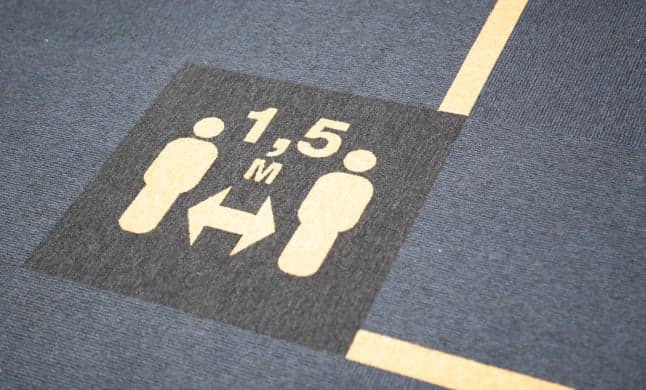Danish local elections: Covid-19 safety measures to be used on polling day

Authorities in Denmark on Monday confirmed a number of safety measures related to the Covid-19 pandemic will be in place when the country goes to the polls in local elections on Tuesday.
Denmark is currently in the midst of a steep wave of new cases of Covid-19, with over 2,000 new cases registered during the last 11 consecutive says and close to 350 people currently admitted to hospital with the virus.
Hand sanitizer, social distancing and outside polling booths will all be features of tomorrow’s municipal and regional elections in an effort to keep turnout high despite the concerning Covid-19 curve, authorities said at a briefing on Monday.
“Municipalities are extremely well prepared and almost all voters are vaccinated. It’s therefore safe and secure to vote tomorrow,” interior minister Kaare Dybvad said at Monday’s briefing, as reported by broadcaster DR.
“In Norway they had a (general) election earlier this year with significantly more restrictions and you could see a small drop in turnout,” the minister noted.
“There’s no reason to be worried about going out and voting but there may be a small drop. We have no estimate of what to expect,” he added.
Over 400,000 foreign residents in Denmark are eligible to vote in the elections.
READ ALSO:
- How to vote as a foreign resident in Denmark’s local elections
- Why should foreign residents vote in Denmark’s local elections?
The exact provisions in place at individual polling stations are determined by the local municipalities.
In general, local authorities are advised to ensure good distancing between voters, liberal use of hand sanitizer and use of outdoors space.
Voters will be allowed to bring their own pens to fill out ballot papers, in a first for Danish elections.
People who are infected with coronavirus are allowed to vote and are not required to present a valid coronapas, in line with the Danish constitution which ensures everyone who is eligible be allowed to vote.
Those currently infected with Covid-19 are instructed not to enter polling stations but to call a telephone number which will be provided outside of the voting location, broadcaster TV2 reports. Staff wearing PPE will then assist, allowing votes to be cast. This can be done from inside of a car or at an outside voting box.
“I cannot stand here and guarantee that infections won’t occur in connection with the elections. That’s also the case for many other societal activities. But (the elections) can be undertaken safely and properly in relation to the epidemic,” Danish Health Authority director Søren Brostrøm said.
Comments
See Also
Denmark is currently in the midst of a steep wave of new cases of Covid-19, with over 2,000 new cases registered during the last 11 consecutive says and close to 350 people currently admitted to hospital with the virus.
Hand sanitizer, social distancing and outside polling booths will all be features of tomorrow’s municipal and regional elections in an effort to keep turnout high despite the concerning Covid-19 curve, authorities said at a briefing on Monday.
“Municipalities are extremely well prepared and almost all voters are vaccinated. It’s therefore safe and secure to vote tomorrow,” interior minister Kaare Dybvad said at Monday’s briefing, as reported by broadcaster DR.
“In Norway they had a (general) election earlier this year with significantly more restrictions and you could see a small drop in turnout,” the minister noted.
“There’s no reason to be worried about going out and voting but there may be a small drop. We have no estimate of what to expect,” he added.
Over 400,000 foreign residents in Denmark are eligible to vote in the elections.
READ ALSO:
- How to vote as a foreign resident in Denmark’s local elections
- Why should foreign residents vote in Denmark’s local elections?
The exact provisions in place at individual polling stations are determined by the local municipalities.
In general, local authorities are advised to ensure good distancing between voters, liberal use of hand sanitizer and use of outdoors space.
Voters will be allowed to bring their own pens to fill out ballot papers, in a first for Danish elections.
People who are infected with coronavirus are allowed to vote and are not required to present a valid coronapas, in line with the Danish constitution which ensures everyone who is eligible be allowed to vote.
Those currently infected with Covid-19 are instructed not to enter polling stations but to call a telephone number which will be provided outside of the voting location, broadcaster TV2 reports. Staff wearing PPE will then assist, allowing votes to be cast. This can be done from inside of a car or at an outside voting box.
“I cannot stand here and guarantee that infections won’t occur in connection with the elections. That’s also the case for many other societal activities. But (the elections) can be undertaken safely and properly in relation to the epidemic,” Danish Health Authority director Søren Brostrøm said.
Join the conversation in our comments section below. Share your own views and experience and if you have a question or suggestion for our journalists then email us at [email protected].
Please keep comments civil, constructive and on topic – and make sure to read our terms of use before getting involved.
Please log in here to leave a comment.